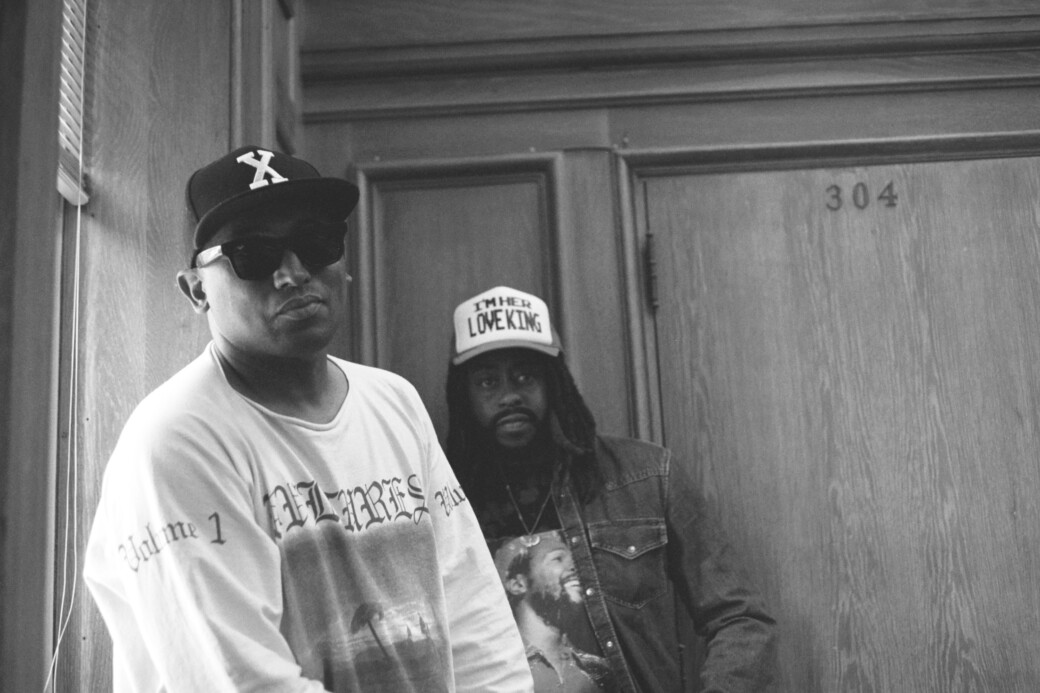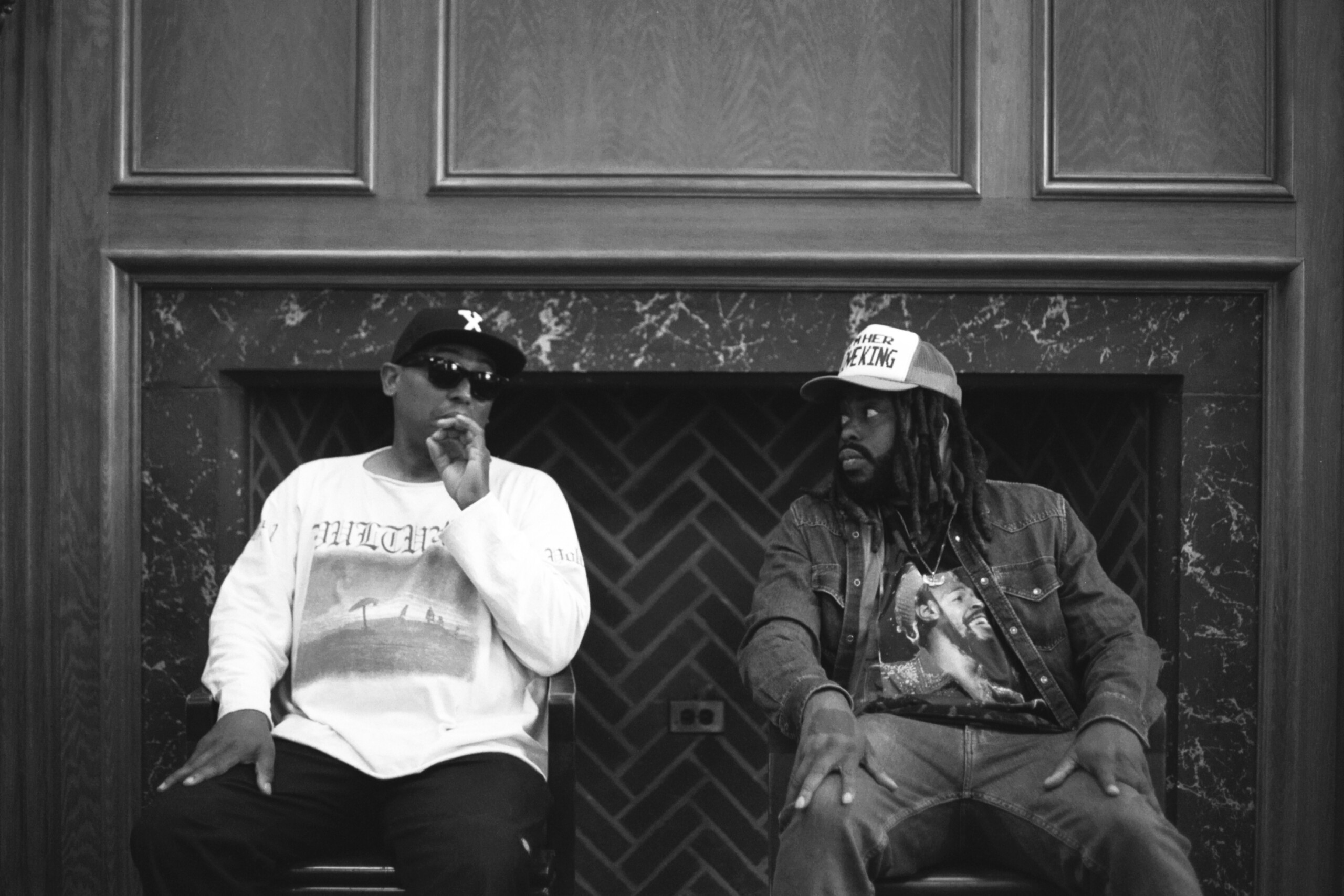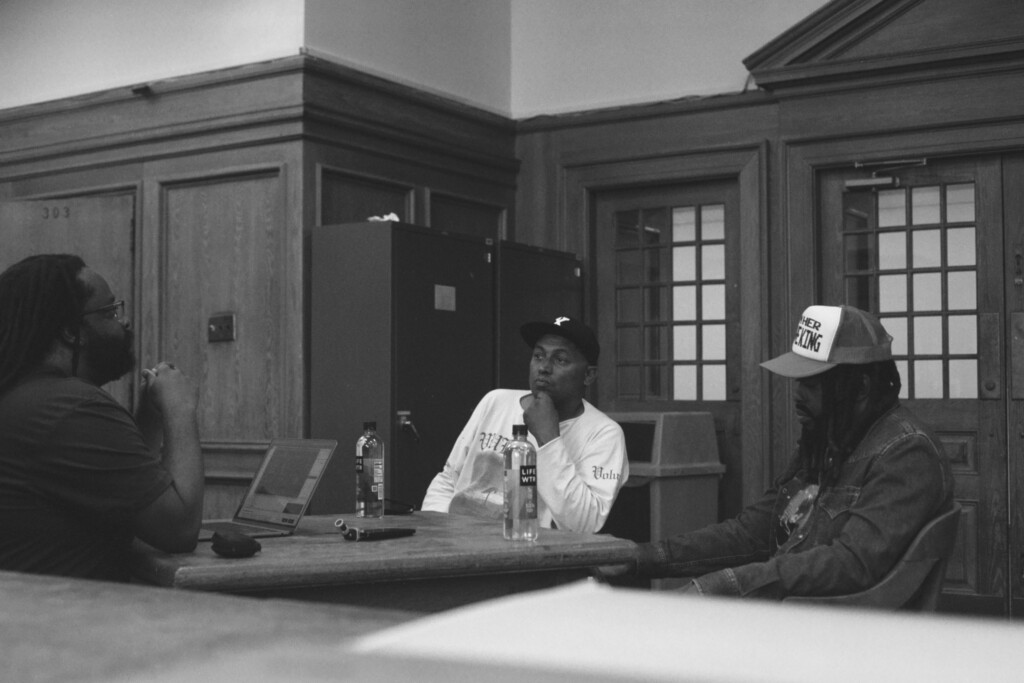Wes Felton and Raheem DeVaughn tell ‘the story of us’

In 2002, journalist Natalie Hopkinson ventured into a nondescript rowhouse in Northwest D.C., home of legendary underground club The House of Secrets. It was Howard University’s homecoming. Upstairs, a duo brought the sounds of U Street to the club’s cramped attic, filling the space to the brim.
The group was the CrossRhodes, featuring W. Ellington Felton (now known professionally as Wes Felton) and Raheem DeVaughn. Published in the Washington Post days later, Hopkinson’s profile of the group captured a underground moment replete with the experimental and improvisational registers that continue to scandalize elite tastes that exist above the ground. In a set that lasted till 3am, the relationship to “performance” was rooted in the disassembly of all the rules.
In the intervening years, DeVaughn would release his debut for Jive, 2005’s The Love Experience, kicking off an ongoing run of mainstream success that has earned him three Grammy nominations and ample time on the Billboard charts. Still, DeVaughn never left the ideological perspectives and musical ruggedness of the DMV’s scene behind. In a series of self-released mixtapes called The Street Experience, DeVaughn pushed back against the expectations of conformity that the music industry holds of R&B crooners, all the while centering the liberatory power of love. For his part, Felton remained a veritable underground presence — not just in D.C., but across the world — while occasionally appearing aboveground on countless records and with a couple of acting credits to his name.
As the CrossRhodes, the duo has continued to record and tour following their debut, the 2004 self-released Limited Budget Unlimited Quality. In 2017, The CrossRhodes returned with Footprints on the Moon, which confronted head-on the political contexts that led to the brutal killing of Freddie Gray and its connections to the rise of MAGA.
Today, the duo says they are back at work with a new project, called Romance in Ruins, that tries to restore romance to its proper place in a moment where we seemingly have forgotten that love will always be the cure. “How do we go back to romance?” pondered Felton. “When I think of romance, I think of individuality, and a person’s ability to, rather than picking one of those low hanging fruits that divide us, actually find a way to go beyond that, and vibrate on a higher frequency.”
Ahead of two sold-out shows at the Birchmere this weekend, CapitalBop sat down with the duo at Howard University’s Afro-American Studies Resource Center to discuss the influence of their musical fathers — both icons of the jazz/improvised music scene — as well as the development of the group’s ethos in the D.C. underground scene of the late ‘90s and early 2000s.
This interview has been edited for length and clarity.
CapitalBop: How did you both develop as musicians, particularly growing up around the musical influences of your fathers? What role did being in that familial and distinct cultural environment play in influencing how your sound developed?
Wes Felton: To be here at Howard is like a full circle moment. My father, Hilton Felton, came from Norfolk, Va. and studied music here. Upon coming here, he discovered not just his passion for his craft, but also his passion for protest.
That’s where my influence — as far as my dad goes — first came. Hearing the stories of rebellion, and then him ultimately maturing out of being rebellious in order to have a thriving career.
More specifically, my dad started his own label here in D.C. (Hilton’s Concept), which featured a lot of well known HU alumni who had their own careers. His independence, as far as his own art and his craft, was probably always the biggest influence for me. The power of ownership of your art — not just from a personal perspective, but also from a professional perspective.
Raheem DeVaughn: My dad, Abdul Wadud, was born Ronald Earsall DeVaughn. He originally started out playing the horn. My grandfather was a singer, which I recently found out. He was a vocalist. So my father sang very well, and played the French horn and a few other instruments.
The main thing that I got from my dad was the independence. Him putting out his first album in ‘78 was called By Myself, which is pretty self-explanatory: “I made this album by myself. This album is funded by myself. And I’m gonna take this photo for the album cover — by myself.”
In the latter years of his life, we were able to have conversations about music and publishing and the importance of these things. And then him being able to run by me, “I got this record company and that wants to do business with me, redistributing my albums.” And me putting him on to a good lawyer that could suit his needs and concerns. Those conversations are invaluable, and those memories are invaluable.
I learned a lot of life skills from my dad. I learned how to cook. My father taught me how to cook, and travel, and move around and keep my ears and eyes to the streets. Spending my summers with him in Jersey and New York prepared me for really dope life skills.
And then going out and seeing what he did for a living. Seeing that musicians could have a life, and make a living out of something that they really enjoy doing. Because of his mental health diagnosis, having schizophrenia most of his adult life, it caused challenges for him as a musician, as an artist and as a teacher.

CB: As you both grew up, how did you come to personally fall in love with the music?
WF: I think what made me really fall in love with music was my dad. My parents split when I was four, so I didn’t have the family experience like my older brother and sister did, living with both parents.
But one of the things that I was able to experience that my siblings weren’t was that if it was my weekend with my father, and he was playing the Playboy Jazz Festival or the Hampton Jazz Festival, I had to go with him and my stepmom to it. So I have great memories of being at the Hampton Coliseum for a jazz fest there and being backstage hanging out with David “Fathead” Newman.
One of my greatest memories was being in elementary school. At the time, the Smithsonian had a program where they were sending musicians to the public schools to do these little programs. And I didn’t even know, but one day my dad showed up, and he was there with Keter Betts and Bertell Knox. And they were presenting music for the school. I just remember always being tickled by that, and I think that’s really when I locked in on it.
RD: I remember listening to my dad’s record collection. I think we’re talking, like, ‘84. Purple Rain sticks out, because I knew that I was not supposed to be listening to that. And I would sneak and listen to it early in the morning. I remember being young, fascinated with Prince at a very young age, fascinated with Bob Marley at a young age.
My actually falling in love with the idea of trying to be a singer was probably my senior year high school, and then my first year of college. That’s when I really jumped off the porch musically and didn’t look back.
As an adult is where I really tapped in to my love for jazz and really a huge appreciation for what my dad meant to the world, and meant to other musicians and meant to his to his students that are now doing amazing things.
CB: There’s a beautiful article that Natalie Hopkinson did back in 2002, discussing a gig CrossRhodes had at an invite-only club in D.C. What was it like to be in D.C., specifically at that time, and how did you both come together to produce that moment?
RD: I’m not a Washingtonian. I was born in New Jersey, grew up when I was here with my mother in Silver Spring. I graduated from High Point in ‘93, went to Coppin State for three semesters, dropped out, came back to Hyattsville, Md., living with my grandmother at the time, all while pursuing music in this itch for wanting to do music.
I did a few groups that I was part of. All In The Mind, which morphed out of my days at Coppin State. That ended, and then I did They Swing with two brothers from the D.C. area. And then I decided I was going to do the solo thing, and stumbled upon Bar Nun on U Street and the open mic scene down there.
WF: I came back from college, and there was this whole resurgence going on on U Street. This was 1998. It was a whole scene.
Speed up, and Raheem and I would hit some of the same open mics. And as I was going to them, I noticed that I didn’t like the format. I didn’t like the idea that anybody, everybody could just get up there, and then you’d see these people who would stand out. And I would just wish that they had more time. Raheem would come through and sometimes he would just rock with the house band that was there. Or sometimes he’d bring some of his fellow musicians. I remember seeing it and I was like, “this guy — he’s gifted.” My ear could hear the gift.
It confirmed for me: we gotta come up with an event that showcases the gifted people in our community, so people can know the difference.
So we started this event. When it first started off, it was called “Picture This.” And so we just went a couple doors over from Bar Nun to Cafe Nema. And so we were like, “we’re gonna start our own little thing. It’s gonna be called Picture This, and we’re gonna feature people.” That eventually evolved into a bigger event called Groove Gumbo.
RD: I met Wes at Bar Nun. One of the things that stood out to me immediately was that he had CDs. He had, like, product! That was like, “Oh, this is somebody I can learn some shit from.”The hustler in me were like, “wait — he’s in here selling!”
That was something that instantly we connected on. I think also Bar Nun, and open mics — whether we realize it or not — it creates division, a level of competitiveness, where you wanna be the dopest of the night and that type of thing. I look at back at Bar Nun now, and it’s like my high school and collegiate years, getting my stripes, preparing me for what was to come industry-wise. It was my prelude, my college. University in real-time.
At some point, Wes extended an invitation for me to feature on what morphed into being Groove Gumbo.
WF: After that, we just locked in. Normally, in scenarios like that, people would pit two artists, especially two Black man, against each other. And so I immediately was like, “no — that ain’t what we gonna do.”
So I just immediately was like, we’re gonna call ourselves CrossRhodes, we’re gonna spell it R-H-O-D-E-S, because it’s gonna pay homage to the Rhodes piano, and it’s gonna incorporate that we’re scholars in certain ways. And that’s gonna be our concept. Because whenever we get together, that’s gonna give you the opportunity to share that social consciousness, the love behind revolution.

RD: I really locked in on making socially conscious music right after I turned 21. June 19, I believe the date is — it’s like a second birthday to me. I was in Baltimore, I had dropped out of Coppin at this point, but I was still going back and forth to Baltimore. An artist I had befriended, who’s a rapper, we were just kindred spirits, much like myself and Wes.
I would kick it at his crib, which was at Warwick and Baker, which, if you know Baltimore, you know — I was in the trenches. And I got shot.
And one of the things I remember that happened that day was making a pact with the universe, with God. I remember making a conscious decision to make conscious music — music of substance — with my life.
CB: It’s interesting you bring that up, because that’s something that’s clearly noticeable in your early careers. But if you look at any oral history of the times, that was the shiny suit era. So was that departure, was that something you all were consciously critiquing too?
WF: When you talk about the shiny suit period, we came up with our own term. We call it:
Both: “Jiggy Conscious.”
WF: Because the word jiggy at the time, was the word. And that’s what they called popular Black culture — you gettin’ jiggy with it. So we were like, “oh, we’re gonna be Jiggy Conscious.”
One of the things that we like to exploit is that we are artists that can perform at the Capitol Building, and leave from there and go over to Mississippi Avenue in Southeast. It’s not a lot of artists that have not just that skill set, but the willpower and the openness.
CB: Talk a bit about the records you all have made over the years, and where CrossRhodes is headed today.
WF: We had our first record in 2002 — Limited Budget, Unlimited Quality. And then Raheem had gotten a record deal, so we created these aliases to go under the radar. Raheem went by Chronkite and I went by Kleofus Joynz, and we did this record in 2005 called The Invitation. And that was our first time bringing in new sounds. We worked with a guy named Kyle Murdock, who’s a Howard Alumni and who is also the nephew of Melvin Lindsay, the original host of the Quiet Storm. And now Raheem is the host of the Quiet Storm.
We released our most recent record in 2017, Footprints on the Moon. What sparked that was the Freddie Gray uprising.
So now, obviously we’re in the times that we are in now. So I’m going to say this on record: we’re working on a new record. Raheem came to my crib and cut some joints that I need to finish. We’re going to call this record Romance in Ruins.
RD: I love the title.
WF: It’s going to help tell the story of us. The first record was straight up: raw samples, loops, not as complex. The Invitation got a little bit more complex. But then jump to 2017, with both of our growth as individual artists, but then also Raheem having more mainstream relationships, so we could call in Rapsody, and Talib, and Scarface. We also started leaning a little more into the sexual Wes. I was always more the person who was gonna remind y’all to stay focused. But on Footprints on the Moon, you started hearing my opinions and feelings about relationships even more in depth.
So I thought it was appropriate that now, it’s Romance in Ruins with all of this that’s going on — with the divisiveness of music and our society. How do we as a community, specifically as Black men and Black women, how do we go back to romance? And what I mean by romance is not just intimacy, but I’m also talking about the romantic era of art, the romantic era of design, of style.
When I think of romance, I think of individuality, and a person’s ability to, rather than picking one of those low hanging fruits that divide us, actually find a way to go beyond that, and vibrate on a higher frequency. So Romance in Ruins is, I think, a perfect next chapter for us.